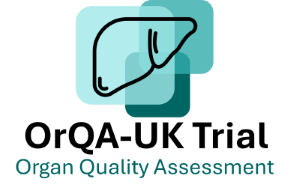OrQA-UK
A novel clinical trial of an artificial intelligence-enabled photograph assessment tool to improve organ utilisation in the United Kingdom.

Contact details
Chief Investigator: Professor Colin Wilson
Trial Manager: charlotte.hickman@nhsbt.nhs.uk
Trial inbox: OrQATrial@nhsbt.nhs.uk
Livers assessed
0/2040
Study summary
Organ transplants have transformed the prospects for patients with organ failure, but there are fewer organs available to transplant than people needing them. Those available may be under-used because of concerns about quality.
Liver quality can be assessed by sending a biopsy to a laboratory, but this takes time and money. Photographs of organs are often used as part of the decision-making process, but image quality is varied and open to error. This means that transplant services rely on the surgeon judging the donor organ's health by how it looks and feels. Transplant surgeons will often play it safe, for example by overestimating the amount of fat in a liver. This cautious approach means that some good quality organs may not be used.
Our team has developed an Artificial Intelligence (AI)-powered tool called OrQA (Organ Quality Assessment) that can standardise an organ photograph, and then accurately assess the organ’s quality and provide an OrQA quality score.
The aim of the OrQA-UK clinical trial is to show that the OrQA AI tool can objectively and accurately evaluate the quality of donated livers, and reduce the rate at which donated livers are not used by an estimated 25%. This could mean 60 extra liver transplants taking place a year.
Study design
In this clinical trial, photographs of livers will be randomly allocated to either having an OrQA score attached to them, or not. The scores will be displayed alongside the liver images for transplant surgeons to see. This will mean we can assess scientifically if the OrQA tool scoring is helpful to surgeons, while still ensuring patient safety.
Partners
The trial is funded by the NIHR [NIHR208448]. The views expressed are those of the author(s) and not necessarily those of the NIHR or the Department of Health and Social Care.



